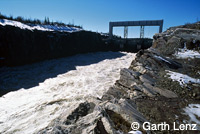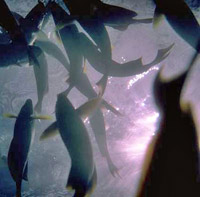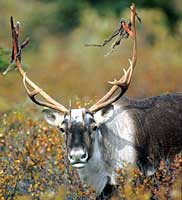
News |
- Cancer Survivors Target Fogging
- Wuskwatim Appeals - PDA & Licenses
- Poll: Devils Lake and Lake Winnipeg Concerns
- Ian Tyson Leads Oil and Gas Protest
- Iskut Women Stop Mining Company
- Protection of Delta Marsh, WMAs Announced
- Dehcho First Nations Release Lands Plan
- First Nation Files Suit to Stop Mining
- Woodland Caribou Listed In Manitoba
- Bonn Kyoto Talks Move GHG Reductions
- Manitoba Needs To Improve - Sierra Club RIO Report
- Constitutional Challenge - Ontario Mining Act
| Cancer Survivors Target Fogging | 13 July 06 |
 A Winnipeg city committee has voted to enlist the Canadian Cancer Society in finding out if mosquito fogging causes cancer. The motion came as two men battling cancer told the city's protection and community services committee their diseases may have been caused by pesticides. A Winnipeg city committee has voted to enlist the Canadian Cancer Society in finding out if mosquito fogging causes cancer. The motion came as two men battling cancer told the city's protection and community services committee their diseases may have been caused by pesticides.Nick Ternette and David Nickarz of the newly formed Cancer Brigade told the committee they believe the city's spraying of Malathion to control mosquitoes impacts the body's immune system and ability to fight off cancer. Nickarz is in remission from testicular cancer and Ternette for lymphatic cancer. "How many people are in a cancer ward because of what's happening in the fogging program?" Nickarz said. "Malathion causes cancer." The city used Malathion extensively last year to control nuisance and West Nile-carrying mosquitoes. City insect control manager Kelly Goldstrand said the city uses more biological agents to control mosquitoes each year, depending on funding. The U.S. Environmental Protection Agency says the level of exposure to Malathion associated with mosquito fogging is too low to be of concern, though accumulation of combined pesticide exposure may be of more concern. View the July 11, 2006 Winnipeg Free Press article (DOC) View the July 11, 2006 CBC article View information on Malathion Medical Research Contact The Cancer Brigade Source: Winnipeg Free Press |
|
| Wuskwatim Appeals - PDA & Licenses | 11 July 06 |
 Appeals contesting the vote to ratify the Wuskwatim Project Development Agreement (PDA) at the Nisichawayasihk Cree Nation (NCN) have been filed. Those who filed appeals have been informed by letter that Justice Ruth Krindle has been appointed to arbitrate the appeals. Appeals contesting the vote to ratify the Wuskwatim Project Development Agreement (PDA) at the Nisichawayasihk Cree Nation (NCN) have been filed. Those who filed appeals have been informed by letter that Justice Ruth Krindle has been appointed to arbitrate the appeals.The Wuskwatim PDA states that the arbitrator shall "not have had, within a period of one year prior to the date on which the matter was referred to arbitration, been a member of a firm that has acted as solicitor, counsel or agent to NCN, Hydro, or any of the parties to the arbitration". Justice Krindle is also an arbitrator for long standing compensation cases involving the Northern Flood Agreement (NFA). Over 350 NCN members have pending claims originating in the 1970s. At least one of the appellants appealing the Wuskwatim PDA vote is also dependant on Justice Krindle in her NFA role for resolution of an NFA claim. Following Chief Jerry Primrose's announcement of PDA vote results June 15th, the Governments of Manitoba and Canada announced June 21, 2006 that environmental licenses for the Wuskwatim Projects were being issued. These announcements occurred prior to the close of the appeal period for the Wuskwatim PDA vote. To date the balloting results for several polling stations, on two days, have not been made public. The PDA appeals are also not yet public. Appeals of the Manitoba Environment Act licenses (transmission system and generation station) can be filed by contacting the director of approvals for Manitoba's Environment Act. Deadlines are in early August. View the July 12, 2006 Winnipeg Free Press article (DOC) View the June 21, 2006 Government of Manitoba press release View the June 21, 2006 Canadian Environmental Assessment Agency press release View Manitoba Wildlands information on the Wuskwatim Licenses View the June 19, 2006 Manitoba Wildlands news item on the Wuskwatim PDA Vote Sources: Wuskwatim PDA, NCN Justice Seekers, Government of Manitoba, Government of Canada, Manitoba Wildlands |
|
| Poll: Devils Lake and Lake Winnipeg Concerns | 11 July 06 |
 Friends of the Earth (FOE) Canada released a public opinion poll assessing the concerns of Manitobans and North Dakotans regarding Devils Lake. FOE decided to poll citizens of both North Dakota and Manitoba to assess awareness and concern. Friends of the Earth (FOE) Canada released a public opinion poll assessing the concerns of Manitobans and North Dakotans regarding Devils Lake. FOE decided to poll citizens of both North Dakota and Manitoba to assess awareness and concern.The poll reveals the polarization of support on either side of the border; 78% in Manitoba oppose the Devils Lake outlet and 66% in North Dakota support it. However, when citizens were asked about precautionary steps, differences in opinion were greatly reduced. A majority of both Manitobans (76%) and North Dakotans (55%) believe that the Devils Lake issue should still be referred to the International Joint Commission, and nearly nine out of 10 (Manitobans (88.75%) and over six in ten North Dakotans (63.3%) support a moratorium on the operation of the Devils Lake Outlet until both Canada and the US agree the water is safe. This high level of concern for water quality exhibited by residents of both jurisdictions sends an important message to government officials. Polling results have been submitted to the North Dakota Department of Health hearing in Devils Lake as well as to Canadian and US officials. View the June 26, 2006 Friends of the Earth Canada press release View the June 2006 Polling Report (PDF) Visit the Stop Devils Lake website View Manitoba Wildlands information on Devils Lake Source: Friends of the Earth Canada |
|
| Ian Tyson Leads Oil and Gas Protest | 06 July 06 |
 Country singer Ian Tyson was among the ranchers on horseback in downtown Calgary June 27, 2006 protesting potential oil and gas developments on the eastern slopes of the Rockies. The country music singer delivered an open letter to Premier Ralph Klein and the Alberta government outlining concerns regarding oil and natural gas development. Country singer Ian Tyson was among the ranchers on horseback in downtown Calgary June 27, 2006 protesting potential oil and gas developments on the eastern slopes of the Rockies. The country music singer delivered an open letter to Premier Ralph Klein and the Alberta government outlining concerns regarding oil and natural gas development. Ranchers and landowners are concerned the rolling eastern slopes of the Rocky Mountains south of Calgary, a key watershed in the area, are facing increasing pressure from natural gas drilling. Compton Petroleum is carrying out exploratory drilling in the area. In addition to expressing their concerns, ranchers are asking for a debate on overhauling Alberta's regulatory system for oil and gas developments. "The current policy of liquidating oil and gas resources as quickly as possible is not in Alberta's best interests," said Tyson, who is a celebrated Canadian singer and songwriter. "It is destroying agricultural communities, wildlife diversity, recreational tourism, and the signature landscapes all along the Cowboy Trail." The ranchers also argue that they don't have enough say in the approval process of the Alberta Energy and Utilities Board, which regulates developments of the province's energy resources. View the June 27, 2006 CBC News article Visit the Ian Tyson website Source: CBC News |
|
| Iskut Women Stop Mining Company | 06 July 06 |
 First Nations' grandmothers from the town of Iskut, B.C. recently prevented a mining company from driving heavy equipment through a trout spawning stream. First Nations' grandmothers from the town of Iskut, B.C. recently prevented a mining company from driving heavy equipment through a trout spawning stream.Rhoda Quock, a spokesperson for the Iskut elders group Klabona Keepers, and Erma (Nole) Bourquin physically blocked BC Metals contractors from driving an excavator, a D6 Cat and drilling equipment sleds through trout spawning in Coyote creek, a tributary to Eddontenijon Lake and the Iskut River. The Klabona Keepers' actions took place June 16, 2006 and mark the latest events in the conflict in the shared headwaters of the Nass, Stikine and Skeena Rivers. The Klabona Keepers are concerned about the mining exploration rush in northwest B.C. and the pressure to approve permits as quickly as companies apply for them. "Fish and wildlife are the lifeblood of our people, and we cannot let them be destroyed simply because BC Metals is in a rush," said Quock. She also noted that her organization is not opposed to mining, but currently there are too many projects being pushed forward all at once, without adequate consultation. The Klabona Keepers' decision to stop the BC Metals equipment was supported by the elected Iskut Band Council and the Tahltan Central Council. View the June 23, 2006 Klabona Keepers press release Source: Mines and Communities Website |
|
| Protection of Delta Marsh, WMAs Announced | 29 June 06 |
 Conservation Minister Stan Struthers announced the addition of two new Wildlife Management Areas (WMAs) to Manitoba's Network of Protected Areas, as well as the expansion of a third WMA on June 21, 2006. Conservation Minister Stan Struthers announced the addition of two new Wildlife Management Areas (WMAs) to Manitoba's Network of Protected Areas, as well as the expansion of a third WMA on June 21, 2006.Delta Marsh, a 10,939ha freshwater coastal wetland located at the south end of Lake Manitoba, has already been recognized as an intergovernmental Ramsar Convention on Wetlands site of international significance, a Canadian important bird area and a Manitoba Heritage Marsh. As a provincial Wildlife Management Area (WMA), part of Delta Marsh will now be protected from development and become part of Manitoba's Network of Protected Areas - logging, mining, hydroelectric, oil and gas development as well as other activities that could significantly and adversely affect habitat will now be prohibited within the 7,841ha protected portion. In addition to Delta Marsh, Minister Struthers announced the designation of the 130-hectare Hilltop WMA near Erickson, and the addition of a 256-hectare parcel of land to the Onanole WMA south of Riding Mountain National Park. As of June 28, 2006 confirmed protected status for these WMA regulations were not available. View the June 21, 2006 Manitoba Government press release Visit the Protected Areas Initiative web page for Delta Marsh Wildlife Management Area Visit Manitoba Wildlands' Protected Areas Announcements page View the Manitoba Wildlands Map: Delta Marsh Wildlife Management Area Sources: Government of Manitoba |
|
| Dehcho First Nations Release Lands Plan | 29 June 06 |
 The Dehcho Land Use Planning Committee announced the release of the Final Draft of "Respect for the Land: The Dehcho Land Use Plan" (Ndéh Ts'edîîchá: Dehcho Ndéh T'áh Ats'et'î K'eh Eghálats'ênda) and associated Background Report in a June 13, 2006 press release. The Dehcho Land Use Planning Committee announced the release of the Final Draft of "Respect for the Land: The Dehcho Land Use Plan" (Ndéh Ts'edîîchá: Dehcho Ndéh T'áh Ats'et'î K'eh Eghálats'ênda) and associated Background Report in a June 13, 2006 press release.The fourth and final Draft of the Dehcho Land Use Plan is the result of four years of intensive work with communities, governments and other planning partners. Its purpose is to promote the social, cultural and economic well being of residents and communities in the Dehcho territory, having regard to the interests of all Canadians. The lands management plan calls for strict protection from development for 50% of the traditional territory, plus special management zones. The initial Plan and subsequent revisions were guided by the most comprehensive consultation efforts on a northern land use plan to date, involving over 140 meetings across the Dehcho territory, Yellowknife, Ottawa, Calgary and Vancouver. The Plan outlines what types of activities should occur, where they should take place, and the terms and conditions necessary to guide land use decisions over time. Dehcho Land Use Planning Committee Chair, Herb Norwegian describes the Plan as "an exciting opportunity for all three Parties to find a balanced approach to resource development and conservation in the Dehcho territory that will move the region towards a new era of clarity and certainty." View the June 13, 2006 Dehcho Land Use Planning Committee press release (PDF) View the June 2, 2006 Final Draft Dehcho Land Use Plan, maps, GIS shapefiles, background report, summary information Visit the Dehcho Land Use Planning Committee web site Source: Dehcho Land Use Planning Committee |
|
| First Nation Files Suit to Stop Mining | 29 June 06 |
 As a result of an on-going conflict over mining claims in northern Ontario, the Kitchenuhmaykoosib Inninuwug First Nation (KI) launched a landmark lawsuit on May 29, 2006 challenging the constitutionality of Ontario's Mining Act. The case will affect thousands of mining claims across the province and could set a precedent for mining activities throughout the country. As a result of an on-going conflict over mining claims in northern Ontario, the Kitchenuhmaykoosib Inninuwug First Nation (KI) launched a landmark lawsuit on May 29, 2006 challenging the constitutionality of Ontario's Mining Act. The case will affect thousands of mining claims across the province and could set a precedent for mining activities throughout the country.The basis for the lawsuit is mining exploration activities being undertaken by junior mining company Platinex Inc. within the traditional territory of the KI (formerly the Big Trout Lake) First Nation. The lawsuit asserts that the company failed to take into account the rights of KI members and will challenge the constitutionality of the Mining Act for giving rise to the conflict. The KI also filed notice that it intends to file a third party claim against the Province of Ontario concerning a $10 billion lawsuit filed by Platinex against the First Nation. Kitchenuhmaykoosib Inninuwug and eight other First Nations called for a halt to all forestry and mining in their ancestral lands in 2005. Eleven conservation groups have also called for a moratorium until comprehensive land use planning is completed in the northern boreal region. Their lands access concerns are similar to Grassy Narrows First Nation. View the full May 29, 2006 Sierra Legal Defense Fund press release View news coverage of the lawsuit on the Kitchenuhmaykoosib Inninuwug First Nation web site View the May 28, 2006 Canoe article View the May 31, 2006 Platinex press release View the May 18, 2006 Manitoba Wildlands news item Visit the ForestEthics web site: Where's McGuinty? Source: Sierra Legal Defense Fund |
|
| Woodland Caribou Listed In Manitoba | 26 June 06 |
 On June 8, 2006, Conservation Minister Stan Struthers finally made good on his promise to recognize the threatened status of woodland caribou under the Manitoba Endangered Species Act. The designation affords some protection for the species and requires the Manitoba government to take action to safeguard the woodland caribou, and its habitat. On June 8, 2006, Conservation Minister Stan Struthers finally made good on his promise to recognize the threatened status of woodland caribou under the Manitoba Endangered Species Act. The designation affords some protection for the species and requires the Manitoba government to take action to safeguard the woodland caribou, and its habitat.The announcement came on the heels of environmental groups' accusations that the province has been dragging its feet on efforts to protect the species. Boreal woodland caribou were once found throughout Manitoba's boreal forest regions. Manitoba's woodland caribou population has decreased by 50% since 1950 and the species have disappeared from the southern parts of its historical range. The decline has occurred as a result of human activities that impact caribou habitat, as well as because of increased predation, parasites, diseases, and uncontrolled hunting. In Manitoba, an estimated 1,800 to 3,200 of woodland caribou live east of Lake Winnipeg, in the Interlake, and in the North. Manitoba Wildlands Director Gaile Whelan Enns commented that, "Legal acknowledgement of the threatened status of Manitoba's woodland caribou is long overdue. Now we need significant new protected areas in our boreal forest regions, where woodland caribou calve, winter, and avoid predators." View the June 8, 2006 Government of Manitoba press release View the Threatened, Endangered and Extirpated Species Regulation, amendment, 124/2006, June 12, 2006 (PDF) Visit Manitoba Wildlands' information on Manitoba's Endangered Species Act  View Manitoba Conservation's Boreal Woodland Caribou Fact Sheet
View Manitoba Conservation's Boreal Woodland Caribou Fact SheetView the June 8, 2006 CBC Manitoba article View the Canadian Parks and Wilderness Society article and Take Action Letter Sources: Government of Manitoba, CBC Manitoba |
|
| Bonn Kyoto Talks Move GHG Reductions | 26 June 06 |
 Delegates at a United Nations sponsored climate change conference held in Bonn during May 2006, agreed on how to pursue negotiations for further cuts in greenhouse gas emissions under the Kyoto Protocol. Delegates at a United Nations sponsored climate change conference held in Bonn during May 2006, agreed on how to pursue negotiations for further cuts in greenhouse gas emissions under the Kyoto Protocol.Describing the meeting as "successful," officials said it has set an "ambitious agenda," which focuses on a sound process leading towards science-based emission reduction targets on the part of industrialized countries within the next few years. "There is a strong sense of urgency and there's a clear consensus that there should be no cap after 2012 when the first commitment period ends," said Michael Zammit Cutajar, who chairs one of the working groups under the Kyoto Protocol. The Kyoto Protocol requires 36 industrial countries to reduce greenhouse gas emissions below levels specified for each of them. This should amount to reductions of at least 5 per cent below 1990 levels between 2008 and 2012. "Industrialized countries have emphasized the importance of these negotiations based on the latest scientific data and taking into account new technological solutions available today," explained Feng Gao, the Convention's Deputy Executive Secretary for Implementation. The next round of negotiation on the Kyoto Protocol and the Convention on Climate Change will take place in Nairobi, Kenya, November 2006. View the UN Framework Convention on Climate Change May 2006 Meetings Press releases View the May 26, 2006 UN Framework Convention on Climate Change press release (PDF) View the Manitoba Wildlands' Canda & Kyoto pages Source: UN Framework Convention on Climate Change |
|
| Manitoba Needs To Improve - Sierra Club RIO Report | 22 June 06 |
 The Sierra Club of Canada issued its 14th annual report on the performance of governments in meeting international environmental commitments, June 16th, 2006. The Sierra Club of Canada issued its 14th annual report on the performance of governments in meeting international environmental commitments, June 16th, 2006.The Sierra Club of Canada has been researching, writing and producing the RIO (Report on International Obligations) Report Card every year since 1993 - to mark the anniversary of the Earth Summit in Rio de Janeiro. Manitoba received a 'B' for its effort on climate change and a 'C+' for its actions concerning biodiversity. Manitoba's biodiversity grade was up from a 'C' in 2005 largely as a result of the government's valiant struggle to prevent the building of the Devil's Lake Outlet. It also received points for its commitment to, "not building transmission lines through the East Side of Lake Winnipeg." Manitoba's climate change grade is up from a 'B-' in 2005 because of its leadership in dissemination of heat pumps, and by undertaking much of the training of installers for the rest of Canada. Manitoba's grade could have been higher in both categories if, for instance, Conservation Minister Stan Struthers had made good on his promise to update Manitoba's Action Plan for a Network of Protected Areas or if the government had taken some concrete steps to actually reduce greenhouse gases in Manitoba rather than simply touting its plan. The 2006 RIO report card is the first to grade the federal government of Prime Minister Stephen Harper. In climate change initiatives, the federal government has slipped from a 'B-' under former Liberal environment minister Stephane Dion, to an 'F' for his successor, Rona Ambrose. View the June 16, 2006 Sierra Club of Canada press release View the 2006 Sierra Club of Canada RIO Report Summary View the 2006 Sierra Club of Canada RIO Report (PDF) View the June 17, 2006 Canadian Press article on Planet Ark View the June 16, 2006 Canada.com article View the June 16, 2006 CTV.ca article Sources: Sierra Club of Canada, Canadian Press, Canada.com, CTV.ca |
|
| Constitutional Challenge - Ontario Mining Act | 22 June 06 |
 As a result of an on-going conflict over mining claims in northern Ontario, the Kitchenuhmaykoosib Inninuwug First Nation (KI) launched a landmark lawsuit on May 29, 2006 challenging the constitutionality of Ontario's Mining Act. The case will affect thousands of mining claims across the province and could set a precedent for mining activities throughout the country. As a result of an on-going conflict over mining claims in northern Ontario, the Kitchenuhmaykoosib Inninuwug First Nation (KI) launched a landmark lawsuit on May 29, 2006 challenging the constitutionality of Ontario's Mining Act. The case will affect thousands of mining claims across the province and could set a precedent for mining activities throughout the country. Mining exploration activities are being undertaken by junior mining company Platinex Inc. within the traditional territory of the KI (formerly the Big Trout Lake First Nation). The lawsuit asserts that the company failed to take into account the rights of KI members and will challenge the constitutionality of the Mining Act for giving rise to the conflict. The KI also filed notice that it intends to file a third party claim against the Province of Ontario concerning a $10 billion lawsuit filed by Platinex against the First Nation. Kitchenuhmaykoosib Inninuwug and eight other First Nations called for a halt to all forestry and mining in their ancestral lands in 2005. Eleven conservation groups have also called for a moratorium until comprehensive land use planning is completed in the northern boreal region. View the full May 29, 2006 Sierra Legal Defense Fund press release View news coverage of the KI lawsuit on the Kitchenuhmaykoosib Inninuwug First Nation web site View the May 28, 2006 Canoe article View the May 31, 2006 Platinex press release View the May 18, 2006 Manitoba Wildlands news item Source: Sierra Legal Defense Fund |
|


 RSS Feeds:
RSS Feeds: